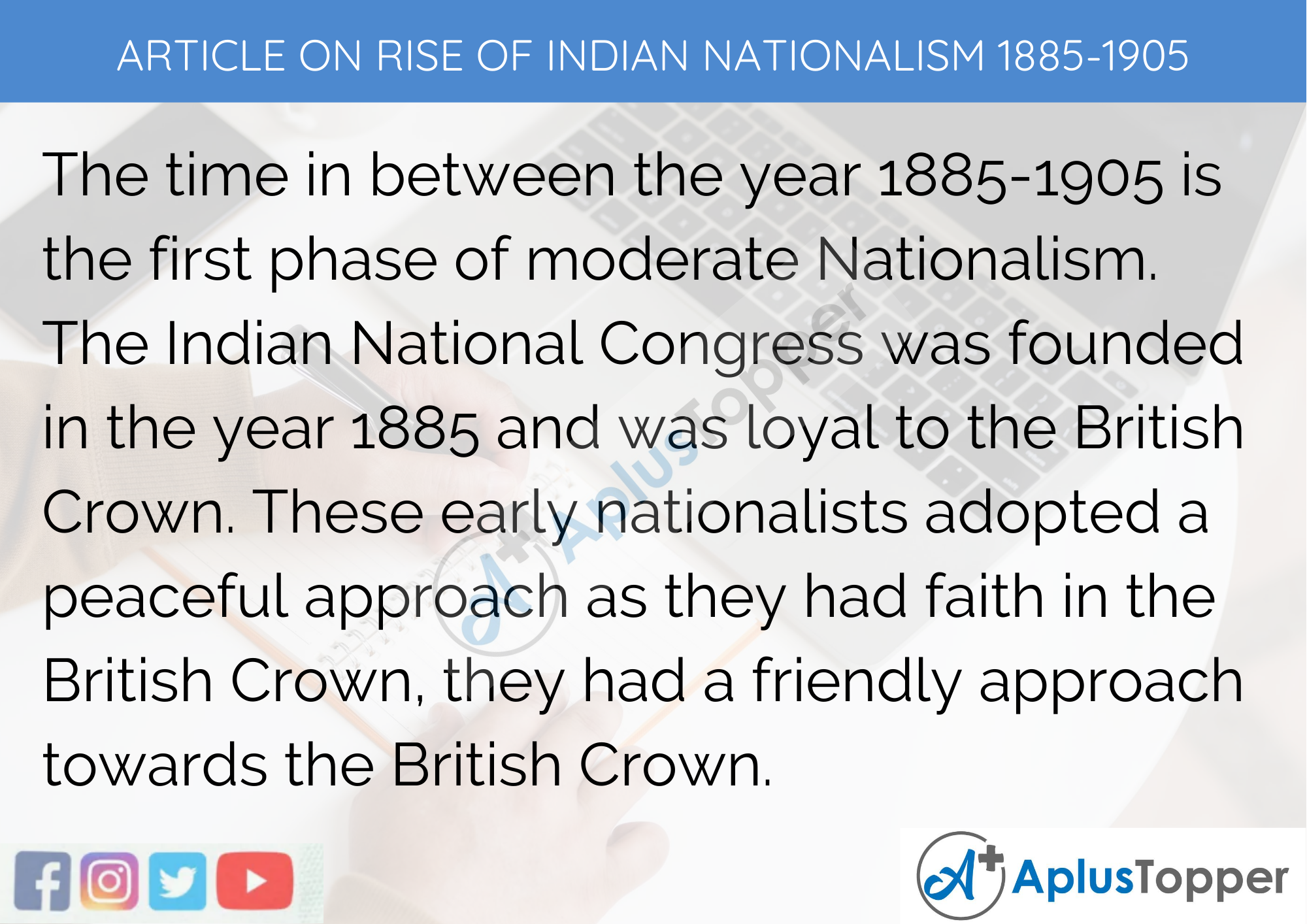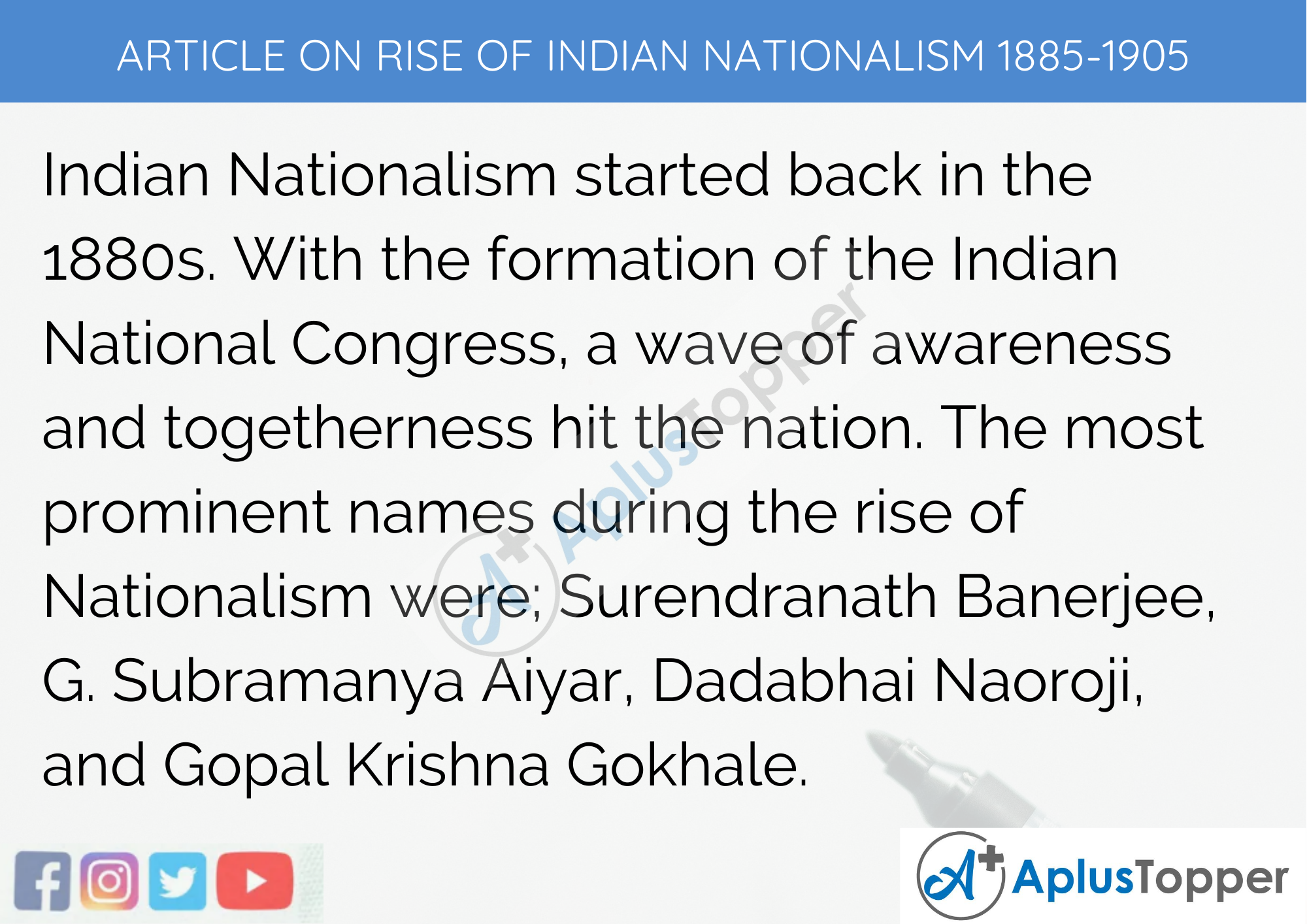Article on Rise of Indian Nationalism 1885-1905: The group of political leaders between the year 1885-1905 was called the early nationalist. They were also known as the Moderates. These leaders initiated or let’s say was at the forefront of the beginning, or the initial days of the organized national movement in India. These leaders were loyal to the British Crown and believed in the judicial system and law and order of the British raj.
Some of the prominent names among the early or Moderate nationalists were; Surendranath Banerjee, G. Subramanya Aiyar, Dadabhai Naoroji, and Gopal Krishna Gokhale.
The first phase of the Indian National Movement was in between the years 1885 – 1905, a time when a wave of neo-nationalism came into place in India. These were the early nationalists, who had the utmost faith in the judicial system of law and order, and were loyal to the British Crown. This was approximately the time when India came under a single administration for the first time in terms of political unity. During this time, The Indian Councils Act of 1892 was passed, an initiative by the early nationalists. And later, the achievements and efforts of the early nationalist became a platform and served as the basis for extremist leaders and nationalist movements.
You can read more Article Writing about people, sports, technology many more.
Long and Short Articles on Rise of Indian Nationalism 1885 – 1905 for Students and Children in English
Below, there are two articles here on “Rise of Indian Nationalism.” One is about two hundred words short article, and another one is about five hundred words long article on the “Rise of Indian Nationalism.” The short article is helpful for students from class One to Five. And the long one is useful for students from grades six to Twelve and those preparing for competitive exams. Long Article on Rise of Indian Nationalism 1885-1905 is helpful for students of classes 7, 8, 9, 10, 11 and 12. Short Article on Rise of Indian Nationalism 1885-1905 is helpful for students of classes 1, 2, 3, 4, 5 and 6.

Short Article on Rise of Indian Nationalism 1885-1905 300 Words in English
The time in between the year 1885-1905 is the first phase of moderate Nationalism. The Indian National Congress was founded in the year 1885 and was loyal to the British Crown. These early nationalists adopted a peaceful approach as they had faith in the British Crown, they had a friendly approach towards the British Crown, even though they felt the presence of injustice in the society and saw the need for proper governance in the country.
The early Nationalists used to believe in a peaceful approach while avoiding any kind of confrontation, moving towards meeting their goals through constitutional means. They believed the relation and continuation of the long term would benefit both countries. This approach was often criticized by fellow Indians, as most of their aims or demands were not entertained by the British.
But the early nationalist was able to spread awareness and unite India. The early nationalists created a widespread awakening throughout the nation; Indians now shared a common bond in economic and political terms. The early nationalists were able to highlight the nature and character of the British empire in front of the nation. The efforts and inputs of these people brought in various reforms in society, and one such achievement is the Public Service Commission appointment.
Long Article on Rise of Indian Nationalism 1885-1905 in English 500 Words
Indian Nationalism started back in the 1880s. With the formation of the Indian National Congress, a wave of awareness and togetherness hit the nation. The most prominent names during the rise of Nationalism were; Surendranath Banerjee, G. Subramanya Aiyar, Dadabhai Naoroji, and Gopal Krishna Gokhale. These, along with many others, initiated the wave of Nationalism in India.
The demands of these early nationalist were:
- To Expand and to reform of the legislative councils.
- A separate Judiciary from that of the executives.
- Providing more opportunities for Indians and giving a platform for Indians to perform by holding the ICS examination.
- Decentralization of power, and incorporating local bodies.
- Protection of farmers from injustice from landlords.
- A reduction in the land revenue
- Providing freedom of speech and freedom to form associations by Indians.
- Abolition of salt tax and sugar duty.
- A reduction of spending in the armed forces.
And to achieve the above demands, the early nationalists chose peace and constitutional approach, as they had the utmost faith in the British Crown. These early nationalists used to confine their political activities only to the educated section of society. With the help of its peaceful approach, the early nationalist brought some reforms in the economy, constitution, and administration. But the method of sending petitions and passing resolutions was criticized as inadequate. Moreover, the early nationalists did not realize the difference in both the British and Indian perspectives, and the clash of interest was overlooked.

FAQ’s on Article on Rise of Indian Nationalism 1885-1905
Question 1.
When was the Indian National Congress formed?
Answer:
The Indian National Congress was formed in the year 1885 on the 28th day of December. Allan Octavian Hume is popularly known as the founder of INC.
Question 2.
Why was the early nationalist important for India?
Answer:
The early nationalist was crucial for India as it helped to unite the nation. The early nationalist spared awareness among the people and showcased the British Crown’s character and nature in front of the country.
Question 3.
Who is the father of Indian Nationalism?
Answer:
Raja Rammohan Roy is known as the father of Indian Nationalism. Whereas, Bal Gangadhar Tilak is known to be the Father of Indian Unrest.
Question 4.
What were the methods adopted by the early nationalist against British rule?
Answer:
The early nationalists opted for a peaceful and constitutional approach. They took the struggle forward with petitions provided to the high government officials. They also carried meetings across the country and united the nation. They distributed leaflets and pamphlets, memorandum, and delegations to reach the masses, convey the message, and present their demands.
